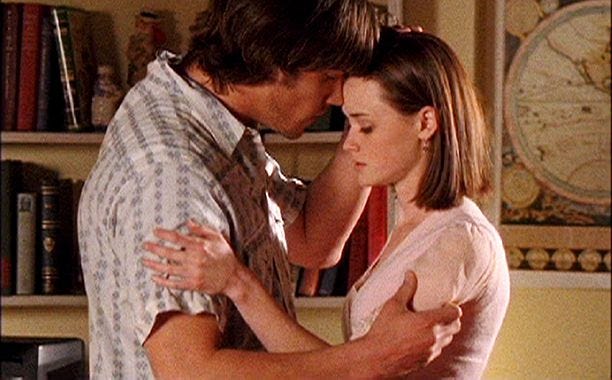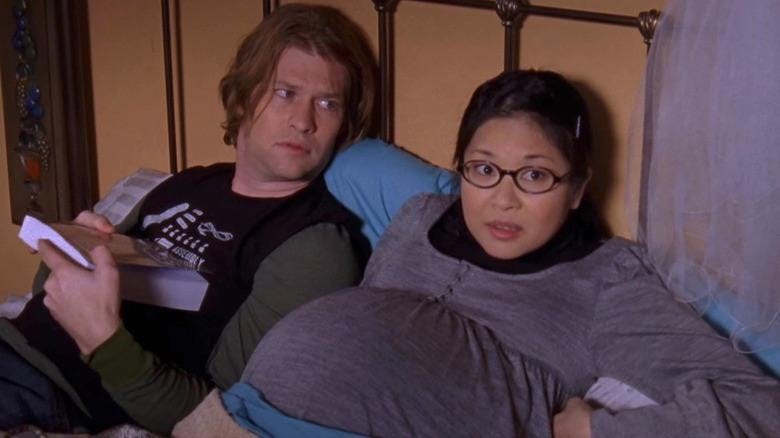from disney channel to rory gilmore: the virginity industrial complex
how purity culture didn’t just shape pop stars — it scripted stars hollow
After a slow year of watching Gilmore Girls for the first time, I’ve finally reached the end of season four. And I’ve come to an obvious conclusion — the writers hated the women of Stars Hollow, Connecticut.
Social media (especially TikTok) is quick to write Rory off as the worst human being alive. And while that’s certainly up for debate, I think she’s more of a victim of a wider phenomenon: 2000s purity culture.
I was born in 2000, but I remember how tight the leash was on teen stars.
The Virginal Ingenue
Britney Spears’ virginity was a hot topic. She was a teenage pop star caught in the middle — cast as a virginal ingenue by the media. Men could fantasize about her and tweens could aspire to be her. When she was romantically linked with Justin Timberlake, everyone wanted to know the status of her virginity. When Timberlake hinted at her infidelity with Cry Me a River, the world turned on her.
The Eternal Virgin Wife
Jessica Simpson was presented as her foil. Proudly, Simpson boasted about “saving herself” for marriage. And then we watched it collapse in on itself on her reality television show Newlyweds: Nick and Jessica. She went from the eternal virgin pop star to the sexy-but-ditzy wife almost overnight.
Disney’s Squeaky-Clean Factory
Vanessa Hudgens and Zac Efron ruled Disney Channel once upon a time. They were my earliest memory of true love, watching them as Troy and Gabriella. They were also kind of freaked out. Every time the photo of them in the sex toy shop or making out on the beach pops up on my Twitter feed, I giggle.
In 2007, at the height of High School Musical fame, private nude photos of Vanessa Hudgens leaked onto the internet. She issued an apology that Disney likely instructed her to do, and a spokesperson added, “Vanessa has apologized for what was obviously a lapse in judgment. We hope she’s learned a valuable lesson.”
Because, god forbid, an adult send her boyfriend a sexy picture. Meanwhile, Zac Efron was posing shirtless on various magazine covers and no one batted an eye; in fact, it was encouraged.
The Jonas Brothers were famous for flaunting their purity rings. They were committed to Christ and vowed not to touch a woman before marriage. Obviously, this didn’t last. They were photographed by Rolling Stone and the rings were gone. Oh, the uproar! Joe then awkwardly told everyone how he lost his virginity to Ashley Greene like a decade later.
The list goes on: Selena Gomez, Demi Lovato, even Miley Cyrus. Miley’s teenage rebellion with Can’t Be Tamed showed exactly what she’d been pushing against all along. She made the network millions during her stint as Hannah Montana. She had more pull with the company than anyone publicly wanted to admit.
America the Conservative
But this essay isn’t about Disney Channel or Britney Spears. It’s about the idea that America is much more conservative than we care to admit.
Stars Hollow and the Virginity Trap
Take a show like Gilmore Girls; a show that is allegedly feminist in its portrayal of womanhood. Every female character is harshly punished the first time she decides to engage in sexual activity.
Lorelai is a teen mother. As a result, she never really grows up and drifts through a string of failed relationships up until Luke.
Paris Gellar loses her virginity in season three, doesn’t get into Harvard, and then promptly humiliates herself in front of her peers the following afternoon.
Lane does save herself for marriage, but immediately gets pregnant with twins. She never finishes college, her dreams of rock-n-roll stardom are sidelined, and she winds up right back where she started — under her mother’s thumb.
The night Rory decides to begin her affair with Dean, her life goes downhill fast. She goes from essentially being treated like the Virgin Mary — all loving, can do no wrong — to grappling with rejection, both academic and romantic. She temporarily drops out of Yale and moves in with her grandparents. And in A Year in the Life, she’s thirty-two, aimless, and back in Stars Hollow. She’s having an affair with Logan and pregnant. Rory never grows up; she just repeats her mother’s mistakes.
The Real Tragedy
And these narrative consistencies are so hard to ignore. Some argue that’s the point of Gilmore Girls — it’s “grounded in realism.” I call bullshit. Success for women shouldn’t be tethered to their sexuality because it never is for men. All of these teenagers do what teenagers do — make mistakes — and they pay for it for the rest of their lives.
Even now, sex is still controversial. By patriarchal design it is the one thing women more or less retain control over. But we are still behind culturally when it comes to conversations about healthy sexuality. It’s either puritanical or overly pornographic. In fact, we have successfully convinced younger Gen Z that OnlyFans and the like are normal expressions of sexuality. That your desire to be sexualized and wanted is your sexuality and not patriarchy whispering in your ear.
The tragedy of Gilmore Girls isn’t that Rory failed. It’s that the show never imagined a world where she — or Lane, or Paris, or even Lorelai — could make mistakes and still thrive. Female sexuality is either a brand, a scandal, or a sin. Rarely is it treated as human.





